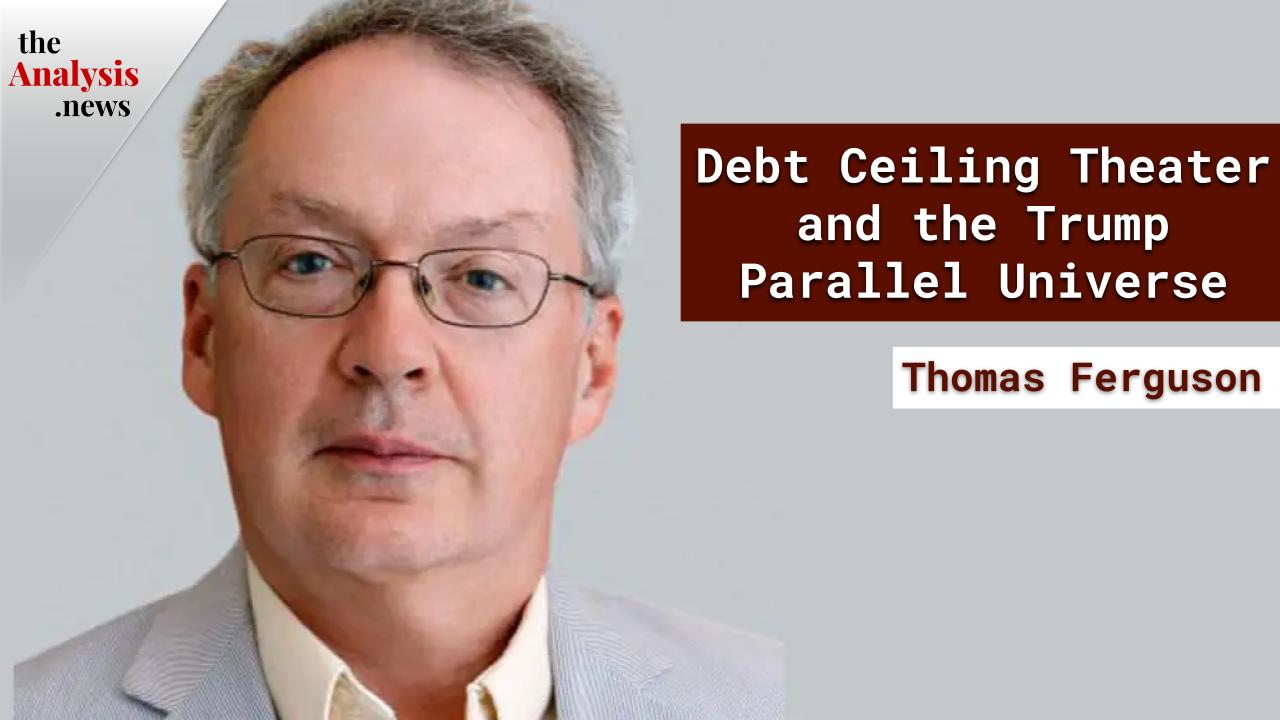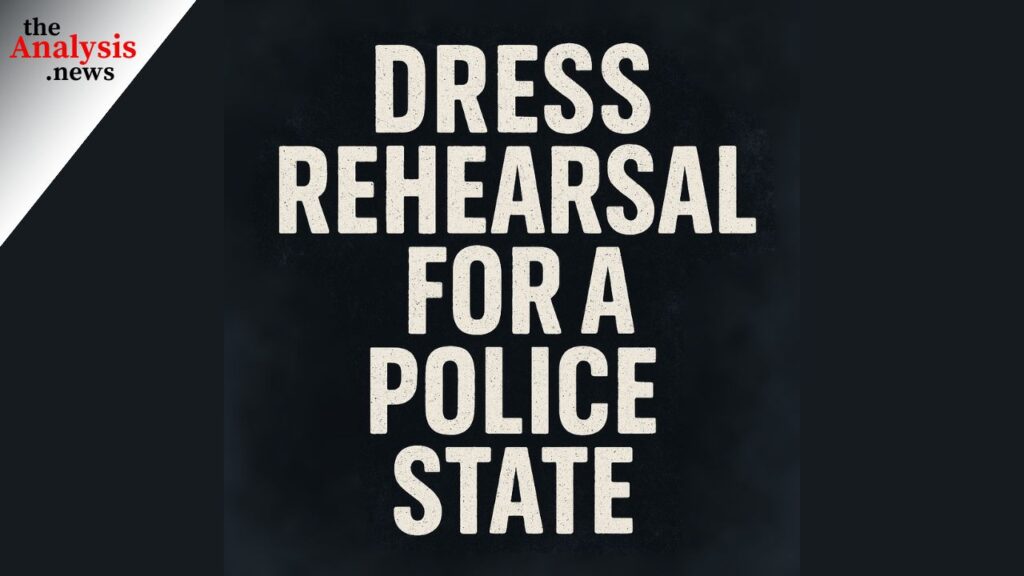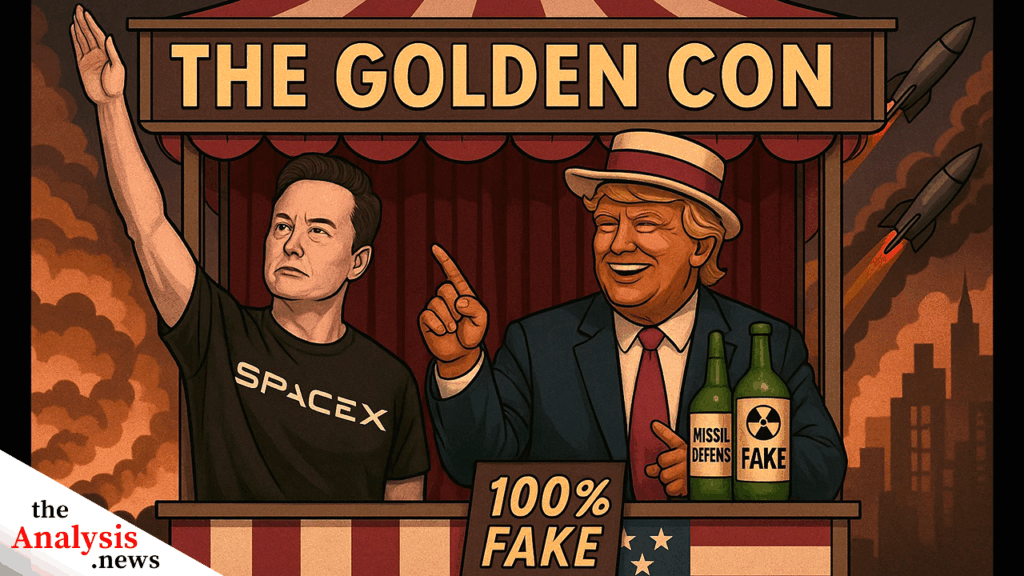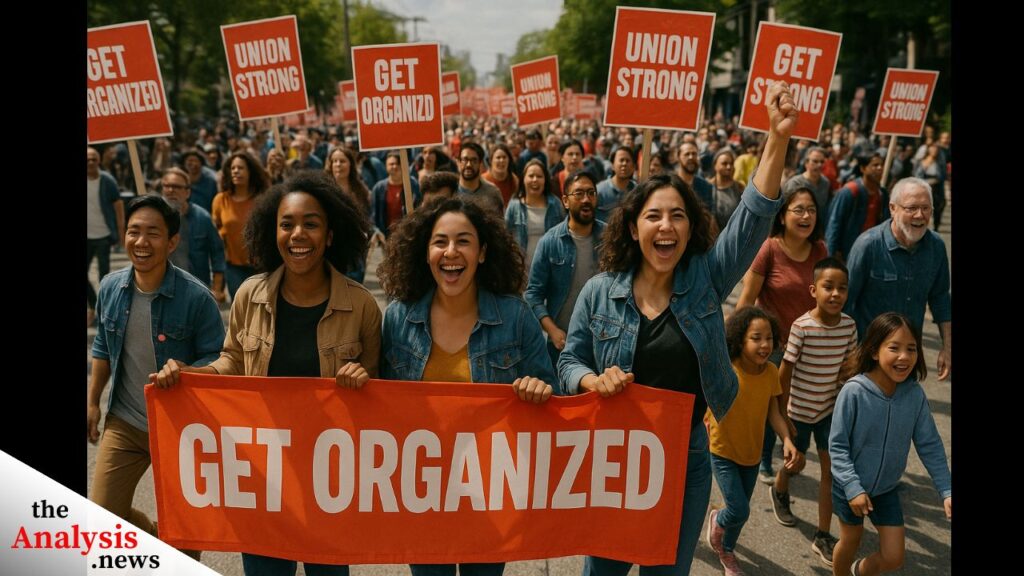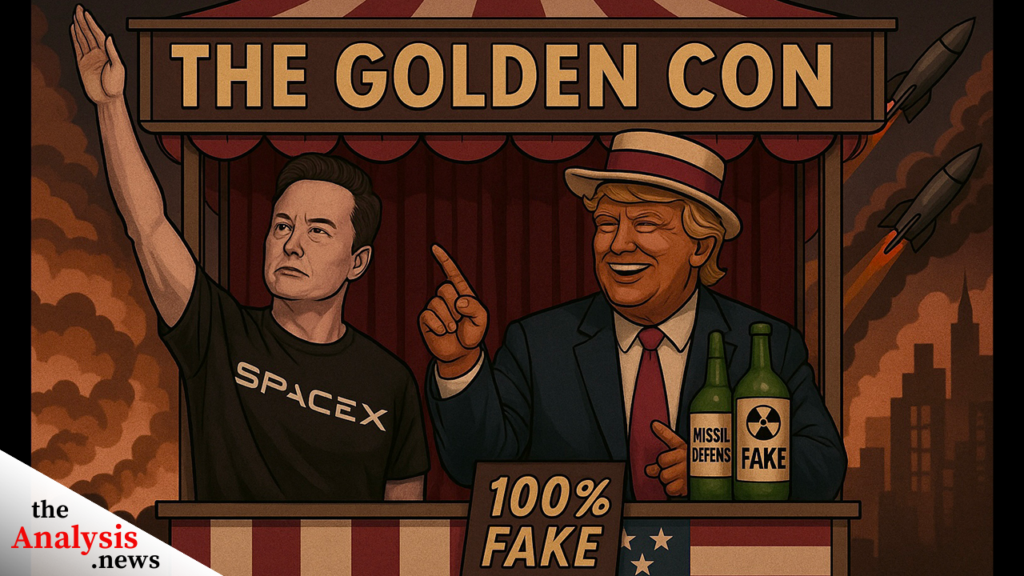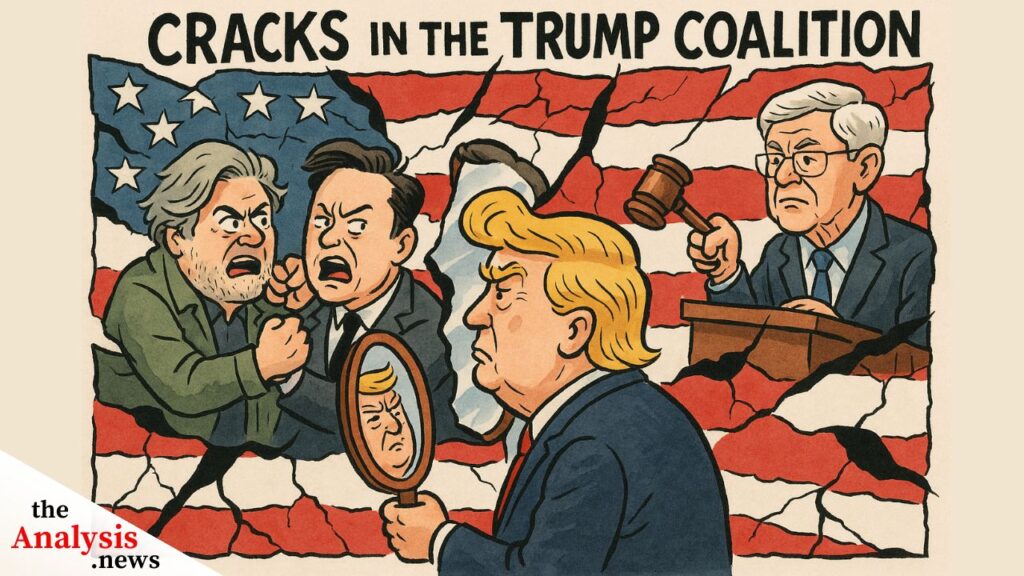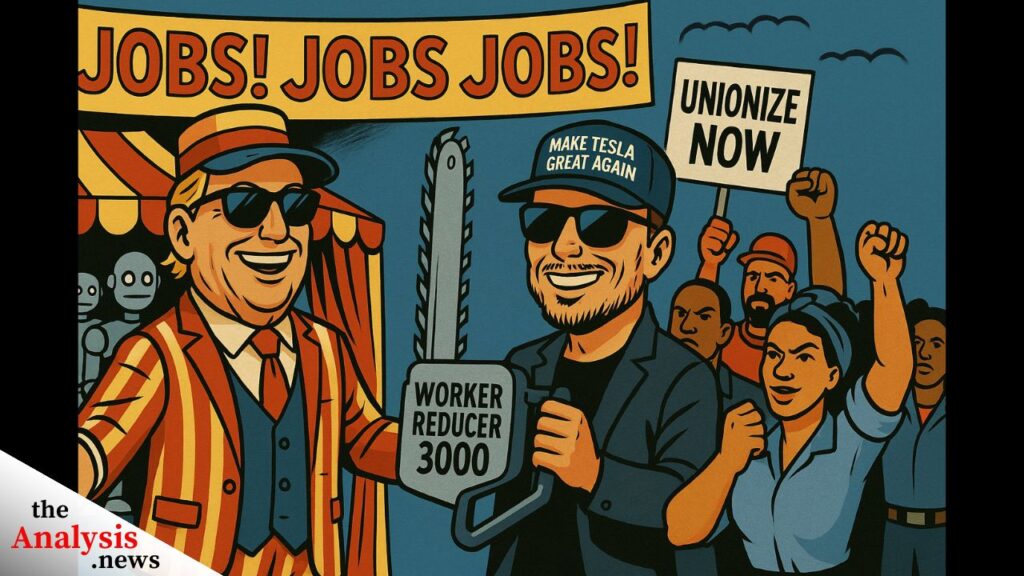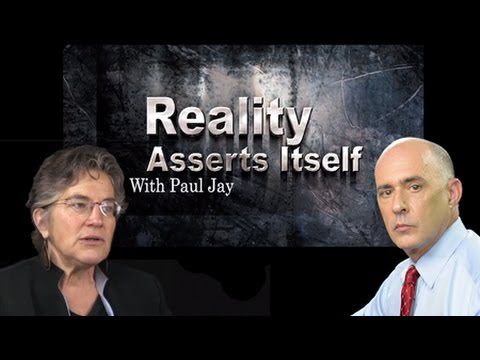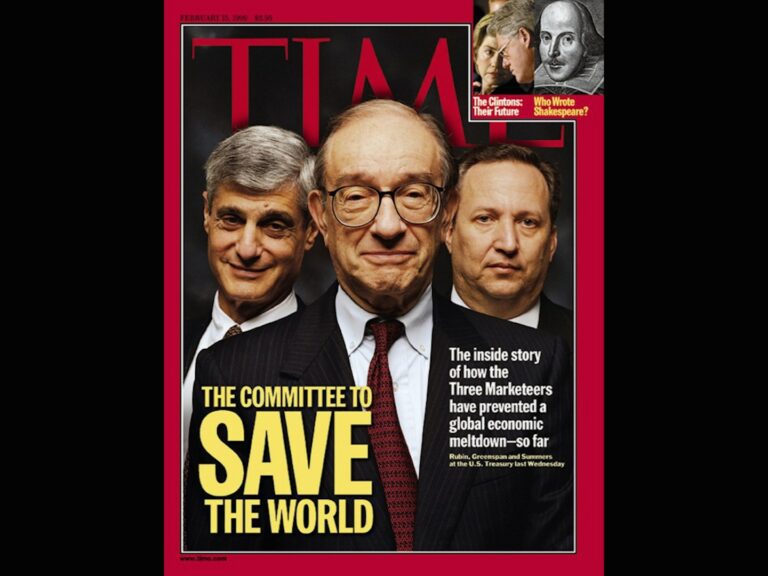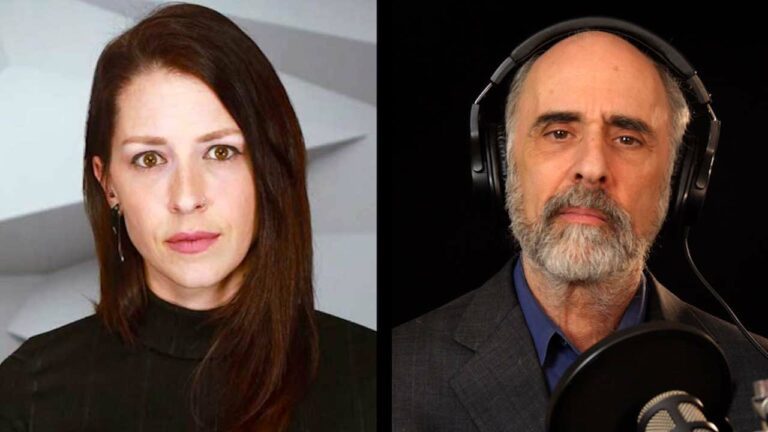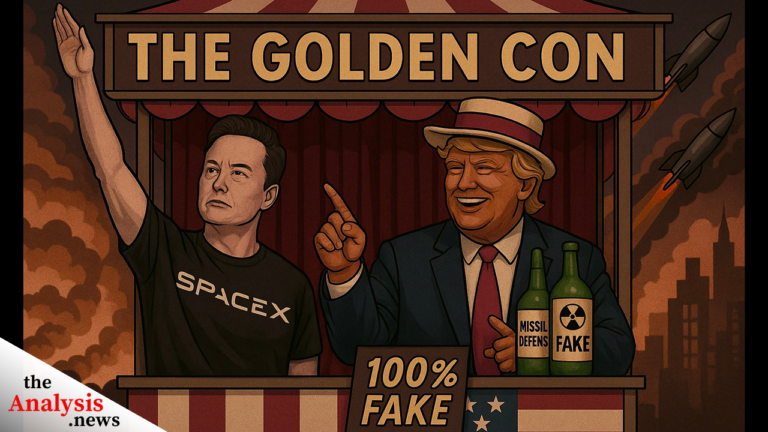Paul Jay interviews Tom Ferguson about the debt ceiling crisis in the United States. Ferguson explains that the debate over the debt ceiling is largely theater, with both Democrats and Republicans working together to cut spending while maintaining the appearance of opposition. He criticizes the Democrats for not raising the debt ceiling earlier when they had the opportunity and suggests that their reluctance is due to their desire to secure more campaign funding for future elections. Ferguson argues that the spending cuts rolled back are not significant enough to impact inflation and proposes alternative measures, such as taxing the wealthy and reducing defense spending, to address the issue. He also discusses the influence of money in politics and the Democratic Party’s efforts to weaken the progressive wing.
Paul Jay
Hi. Welcome to theAnalysis.news. I’ll be back in just a few seconds to talk with Tom Ferguson about the debt ceiling debacle, the debt ceiling crisis, the debt ceiling theater. I don’t know, take your choice. Be back in just a second.
Tom Ferguson is probably the leading expert in the United States on money and politics. He wrote the seminal Golden Rule: The Investment Theory of Party Competition and the Logic of Money-Driven Political Systems. He’s also the Director of Research at the Institute for New Economic Thinking. Thanks for joining me, Tom.
Thomas Ferguson
Glad to be here. Now, as the Pope said, “I’m still alive.”
Paul Jay
So in a recent piece in Naked Capitalism, Yves Smith referred to this debate over the debt ceiling as kayfabe. For those that don’t know what kayfabe is, this is a term for people who believe professional wrestling is real and report on the theater as if it’s actually the story. How much of this is theater? What is this thing really about?
Thomas Ferguson
Well, what it was about was an effort to cut spending, jointly administered by the Democrats and the Republicans, in which the Democrats didn’t have to look like they were trying to cut spending, merely acceding to the pressure put under them unbearably by the Republicans. In other words, much closer to the professional wrestling example that you were describing.
Legally, it was, are we going to raise the allowed level of borrowing by the government to pay debts, to pay off, in effect, the deficit to keep it going? What a surprise. All of the folks eventually decided they would do that. What they had to do to do it was to get a compromise between the two major parties on what they were going to chop out of the budget. That is the story in brief.
Paul Jay
Now they’re forcing cuts to legislation that Congress has already passed. So Congress has approved this spending, the House flips to the other party, and they’re undoing something that Congress already said should be done. Am I getting that right?
Thomas Ferguson
Look, forgive me. As an old fan of the Peanuts, do you remember when someone was holding the ball for Charlie Brown, and then they would jerk it away when he went to kick it? That’s sort of what’s happening here. They were snatching the ball when everybody thought it was going to be a kick. Yeah, that’s the theater aspect of it. That’s the part that my colleagues Paul Jorgensen, Jie Chen, and I actually focused on in our little piece on the debt ceiling debate.
The puzzle here is pretty simple, Paul. It’s like, as the New York Times put it, which must mean that it’s true, right? It said that the Democrats could easily have fixed this problem by raising the debt ceiling when they had control of both Houses of Congress. They chose not to do it but instead waited. They could have done it in the little intersession before the new Congress took over. They didn’t do it. Instead, they decided they’d negotiate with the Republicans. To which the only sensible answer is, why on earth would anybody try to negotiate with the House of Representatives run by [Kevin] McCarthy and company over, say, public spending if you didn’t have to do it? It was far better to negotiate, even with Joe Manchin, as many people said, but they didn’t do that. That’s the theatrical look.
Paul Jay
That’s the key to it. They had two opportunities to do that. They could have done that in the first two years of the Obama administration. They could have done it in the first two years of the Biden administration. So you got to go back to, I guess, your thesis on money and politics. Why didn’t they do it? They could have done it.
Thomas Ferguson
It’s the perfect swindle, I’m sorry to say. You take a bunch of big donors. You’re Joe Biden, and you got elected by appealing to large numbers of big donors to beat down Bernie Sanders. At the same time, you have to run a political coalition with progressive Democrats. Biden didn’t do what Hillary Clinton did, which was to shut Sanders completely out of everything pretty much after she won control of the party. They were pretty careful not to do that. So they actually did run on what I’m tempted to describe as normal coalitional politics. With the progressive Democrats, they’ve actually tried to put people in charge of the Federal Trade Commission who actually believe in antitrust. No one has seen that in so long they can’t remember. Well, they didn’t do much in the CDC for that, but, well, all right, we’ll pass over that one. But they did make serious efforts on a variety of other domestic policy dimensions, including the initial big stimulus package, the one that got Larry Summers and so many other people the exercise.
Now, their problem is that Biden wants to run for president again. He wants to get reelected. They have placed all these programs that were, in effect, coalitional programs with progressive Democrats. But now they’re trying to raise more than a billion new dollars. Now, you don’t have to be a genius to figure out the big no-no in American politics.
Paul Jay
Let me jump in for a second. Raise a billion new dollars to pay for the new presidential campaign?
Thomas Ferguson
Yeah, they’re running a presidential campaign. Yes, exactly. It’s political money that we’re talking about here. So they want that cash. You have to face the fact here. You may remember when Biden proposed to minimize the hit to the budget deficit by very modest new taxes on upper-income groups and businesses. Not a single business organization in the United States supported that package. There was a lot of clucking in some quarters, saying, “Well, that’s really inconsistent since they say they really like a lot of the stuff.” There was even substantial business support for some of the climate change legislation, certainly for all the tax credits and things that make that go.
There’s nothing inconsistent about that, actually. If you sit around and you live in a money-driven political system, of course, they want to have tax credits to go green, if you like, for the people who favor that, not the legacy energy providers. We’ll set them off to one side right now. But if you like that stuff, there’s nothing inconsistent with expecting the people of the United States to pay for that, too. In other words, you want the tax credits, but you won’t pay for it. That’s just big-money politics. There’s nothing puzzling about this.
Now, the perfect swindle on this from a Democratic side is to actually vote the stuff, come out in favor of it, and then do a deal much later where you take back much of the spending on the very poorest people. I mean, the stuff about trying to make work requirements for eating and things like that, how low can we go? The answer, of course, as we all know, is very low. It’s a perfect swindle, and that’s when you do this. They’ve been doing this for 40 years, Paul.
Note this. When the same type of situation occurred, they needed a debt ceiling raised after the Trump taxes were put through; the Democrats just waived the tax cut through. They did not seriously contest it. Obama did exactly the same thing in that fabled 2011 “compromise,” where most of the Bush tax cuts were put right in place. I remember, and I may even have talked to you about it at the time; it was just ridiculous. How crazy is this?
Basically, the Democratic-aligned among big business, we’ll call them corporate Democrats, which is certainly the majority of the presidential party and a big chunk of Congress, don’t raise taxes on the rich. Do try to keep your credits going with your electorate, which doesn’t quite perceive this problem as you separate it in time and just keeps going. It’s perfect. You can’t ask for it any better, and they do it. They’ve kept it for 20-some years. It’s Groundhog Day every two years or so to raise the limit. Somebody put out a press release after we published our piece and said, “Why do the Democrats do Groundhog Day all the time?” That’s why.
Paul Jay
The favored structure in Congress is that one party controls the House, and the other controls the Senate, so nothing serious can be done. Wall Street loves that structural paralysis. When you get the odd time when one party controls both, and the Dems have had two opportunities, this gives you a second kick at the can for Wall Street and such to roll back any spending they don’t like.
The underlying argument is that spending is inflationary. That’s supposed to be why the Republicans are pushing so hard, and that’s how they sell their positioning and all this. How inflationary is the spending, and is what was rolled back going to have any effect on inflation?
Thomas Ferguson
All right, what was rolled back? Especially when you pick up the requirements. In effect, what you’re trying to do with the most famous one is add so many requirements for getting fed, if you’re able-bodied, that you just stop. You end up having to fill out forms and everything else. It’s just denial of benefits by another name.
Now think about this for a second. If you think you have an aggregate demand problem driving inflation, which is a separate conversation, but they probably do, what kind of debt are you going to make in that aggregate demand by just cutting some people off from some food aid or failing to make up the difference in inflation for lots of social programs? You’re not going to make much of a dent at all. If you want to deal with your aggregate demand problem, a much simpler thing would be– I’ll go back to the paper that Servaas Storm and I wrote. There are lots of ways to deal with this besides throwing people out of work.
To back up just a bit further, huge chunks of our current inflation haven’t got anything to do with aggregate demand. There’s supply shock after supply shock after supply shock. But there are a lot of wealthy people out there spending, still spending, even after the decline in the markets on the basis of fairly long-term rises in either their home values or stock market values from the time they originally bought the stuff. I say that knowing perfectly well that markets also went down there.
If you want to stop aggregate demand inflation, you’re much better off telling people, okay, look, if you’re rich, instead of throwing everybody out of work, we’re going to make you buy some bonds. We’ll pay you for the bonds. I’m not talking about confiscation here. It’s just the old [John Maynard] Keynes How to Pay for the War idea. You could pull money from the rich out, and that’s pretty easy to do in theory. Politically, you might as well try to force all your water to run uphill or something like that. We know what the problem is with that, but you could do it.
I think, not even on paper are they trying to cut defense spending. Everybody agrees that in the end, after you move all the money around, it’s not going to be cut at all. That’s inflationary, too, isn’t it? If you think that you have an aggregate demand aside from inflation and I would agree there is some. That’s why I would favor what I just said: let’s have people who are well off put some money away from spending right now. Save for everybody, including themselves. We’re going to pay them interest on that. That’s what I would do. That’s why the whole inflation argument hasn’t got any role in this thing.
Of course, the other move you could make is you could take back some of the Trump tax cuts. Now they somehow never get around to that. There are perfunctory noises followed by nothing. If the Democrats were interested in making a rise in taxes cut by Trump an issue, it’d be pretty easy to tell us about it and create public opinion that would push on that. If you see any trace of this, you let me know, would you? I mean, you’re sitting in Canada, so you can see the whole country at once, as it were. You just tell me. Don’t make me laugh. An unsympathetic being would say it’s just scandalous. I’m old-fashioned, so I’m still appalled.
Paul Jay
There were some senior voices in the Democratic Party, including [Janet] Yellen at one point, who were for getting rid of the debt ceiling. Apparently, constitutionally there’s a fairly strong argument that the legislation itself is unconstitutional. Biden is so committed to this bipartisanship when clearly it doesn’t play in the Democratic Party’s favor electorally, other than money. Is it just money, or is there some electoral–
Thomas Ferguson
There might be a tiny advantage, but it’s almost entirely to the Republicans anyway. There are a few folks around who still believe that deficits, by their nature, are unhealthy. There is, I think, a tiny voting block there, but that’s already Republican. You’re not going to gain a lot of votes there.
No, I think this story is that we have a problem. Let me sketch it for you. An enormous chunk of the business community doesn’t trust Donald Trump. That’s clear. Some of them even promised in the wake of January 6, 2021, storming of the Capitol that they would even stop giving money to the Republicans who voted to unelect Biden, if I may put it that way, just for clarity. Now nearly all of them have, in fact, gone back on that pledge. I mean, they still want to be with the Republicans, but they don’t trust Trump. So there’s a very strong presumption that somebody like Biden, who is basically a conservative Democrat with a long history– when guys talk about cutting deals, they’re not cutting the social program deals except generally to chop them. They are willing to live with Biden, but they are very suspicious of the progressive wing of the Democratic Party. The internal apparatus in the Democratic Party and the White House is very suspicious of that wing. I think a careful observer can see that they have tried repeatedly in both the off-year election and [inaudible 00:18:35] to weaken the power of the progressive Democrats a lot while having to also run a coalition. In the short term, they try to satisfy what they can’t but what they must. In the long run, they try to whittle away their power.
This is a real unstable combination. It’s not guaranteed to stick around forever. After all, consider this. You’re in an incredibly volatile, by its nature, atmosphere. What’s the volatility? It’s this. The overwhelming bulk of the population has lost big on inflation. Hardly anyone now is even trying to claim that inflation has been wage-led. I mean, you get these insane discussions and some weird ones. One of the weirdest was the [Ben] Bernanke and [Olivier] Blanchard thing where they basically said, “Well, it’s not driven by wages. But on the other hand, that’s what we really got to worry about.” It’s like, what? I mean, come on. Why don’t we go after the things that actually are raising prices, of which profit-led inflation is a pretty obvious one, but we’ll set that aside. That’s Brookings, so what can you expect? There is that side.
It’s not, in other words, like Biden has a lock on everybody’s votes. I know the White House is touting themselves as hugely worker-friendly, and they have done a lot of reasonable things to the National Labor Relations Board, for example. But you know what, the percentage of unionized workers has dropped every year Biden’s been in power, and the losses on inflation, in general, are fairly substantial. That’s a problem as you go into an election.
Look, this is pretty obvious. They say it often enough that you don’t even have to reconstruct it. They think they need a billion dollars to win this election and that money is not going to be coming from the workforce that is getting squeezed by inflation.
Paul Jay
Why do they need a billion dollars to win this election? Let me add a piece to that. Some people suggest that if Hillary [Clinton], when she ran against Trump, if she had actually vigorously spent money and campaigned in the swing states, Trump would never have won. Why does it take so much money to beat Trump? I know he got 75 million votes, but in terms of what happened in Pennsylvania in the last election and what happened in Michigan, it doesn’t look all that great for Trump.
Thomas Ferguson
No. Well, all right. As a matter of fact, I haven’t looked this week, but when I last looked in the polls, Trump was running ahead of Biden.
Paul Jay
Well, then the question, why Biden?
Thomas Ferguson
Well, yes, that is a question.
Paul Jay
Does Wall Street want Biden?
Thomas Ferguson
There are a lot of Wall Street guys saying, “We don’t want the choice between Biden and Trump.” They said this last week. I think William Ackman started it, but there were lots of folks writing it up, and the burst of media frenzy showed you that you had a little burgeoning; I don’t want to say a mass movement because I think he’d get 1% of the vote, but Jamie Dimon for president.
There are a lot of folks that think Biden is in danger of going too far to the Left. What they really mean by that usually is they don’t like the Democratic Party. They don’t trust it. It has a strong progressive wing right now, and they don’t like having to deal with that. They’d really like to have a center-right Republican. There’s only one problem with that, and you know what it is. It’s that Trump keeps going up in the polls in that strange universe called the Republican electorate. It really is a parallel universe. In this world, he’s a potential winner. What does he refer to? ‘DeSanctimonious,’ the Governor of Florida.
Paul Jay
Are the Dems worried that Wall Street will go back to supporting Trump? When you go back to January 6, the doors of Congress were breached at 2:10 in the afternoon. At 3:10 in the afternoon, something happened which was reported but has never been talked about since.
The National Association of Manufacturers issued a press release calling on [Mike] Pence to invoke the 25th Amendment and remove Trump. They were the biggest lobbyist, pro-Trump organization for the four years he was president up until his refusal to transfer power. Would the corporate elites really switch back to Trump again?
Thomas Ferguson
Right now, no. But picture this. First question, nobody knows how deep the recession is going to be. That’s a huge imponderable. Then there is, of course, the question of how much the Democrats are going to try to make themselves over as Republicans. I am among those. In fact, I may have invented the argument in some readings of that, that thought that Hillary Clinton really fell down there thanks to Obama.
I do think that the 2011 deal with Obama took some years to really kick in because it was constraining spending going forward for quite some time. I actually read every single one of the American National Election Survey interviews in 2016, and there were a bunch of people that are just obviously saying, “We don’t see,” including some I remember from black women who were just saying, “We don’t see any difference between the Democrats and the Republicans.” Other people did, and a lot of people did, maybe after the election, but they didn’t see it at the time in terms of policy, particularly if you’re sort of looking mostly at contrasting the policy you just experienced with what somebody’s promising. I think Biden did start this. I don’t think the deal was as bad as it could have been when they started talking about it. In that respect, I think they didn’t collapse the differences between the parties in the way Obama did, for example, on a lot of spending programs. If you’re asking if this is a clinical appraisal, no. But the Democrats have probably hurt themselves with their electorate, I think, and that over the next year will become even more obvious.
Paul Jay
But go back to this question with the corporate elites who, as I suggested, one of their most important lobbying organizations actually called for Pence to remove Trump.
Thomas Ferguson
Yes.
Paul Jay
Will these same elites go back to Trump?
Thomas Ferguson
In a deep recession, and if it looked like that. Here’s the other real element of instability here that nobody talks about, but which is obvious, which is, look, you’re now into your sort of third year or so of inflation running ahead of wages, mostly. The very poorest wages have come up for reasons that had nothing to do with federal policy. We can do that some other time or even later if you want. Basically, you couldn’t get anybody to be a nursing home person when you were being paid little, and it turned out to be very dangerous, which was not on anybody’s radar when they were doing low-wage jobs before 2020. We’ll set that out to one side. People are losing three years in a row. You may see a strike wave. There is a lot of evidence of all kinds of small strikes, some bigger strikes once in a while. The railroad worker strike is really obvious, and that was settled by the Biden administration on terms in favor of the employers. This stuff could destabilize folks. A strike wave in a deep recession, you could see almost anything happen.
I hesitate to mention the Specter of Weimar, but this one has a similar look to that thing. I mean, that is to say, you have a substantial progressive group of people in one party, the leader of the country that is only partly on their side, mostly in the Weimar case, totally opposed. On the other hand, the other side, well, brand X with an altogether different twist. I think things are pretty weird. If there were a sort of VIX index for instability in politics that you could easily calculate, I’d say this thing is much dicier than people think. I repeat the point: we don’t know how in a deep recession with a strike wave that could strengthen the progressive faction; that’s what happened in the New Deal.
It’s worth making this point because I see all these contrasts between Roosevelt and Biden generally, obviously to the detriment of Biden. Roosevelt had to be pushed into moving Left in ’35 and ’36 after the collapse of the first New Deal, and a strike wave then surged. That’s what actually happened.
I’ve written a lot about this in my papers on the New Deal. The strike wave often drops out in a lot of discussions, not in most historians, but in political studies. They don’t tend to take that much account of it. They should. If Biden falls down a couple more times, you may see an effort to find somebody else. Now, you heard it here first. I think they’ll go for a Democratic governor who appears to be far from the madding crowd in Washington and it will probably be a he.
Paul Jay
Could be a she from Michigan.
Thomas Ferguson
If I had to bet, I’d say Gavin Newsom is the first one, but that’s just me. I mean, I could be wrong about that. This is a clinical judgment from a light year away on light for stars that haven’t actually begun to shine yet. This could happen. I think this is the most labile and unstable political situation I think I’ve ever seen.
Paul Jay
Do you think Biden’s hanging on purely for personal reasons, like he just wants to be president again or is Wall Street saying, “You’re the only one we can really get behind?”
Thomas Ferguson
No, I think both. A lot of people in the White House want him to stay in, he wants to stay in, and there’s a constituency that sees he’s electable. They clearly think that they can beat Trump. They are basically calculating, I think, that the abortion issue will help them a lot, which I think it will. In a deep recession, it may not be enough.
I repeat the point that nobody in the White House, and for that matter, nobody in Congress, can control what the reactions are on the streets as inflation just persists. Right now, you got lots of people saying it’s going to drop. I think it’s going to drop too, but, well, let’s see how much it does and see what happens. Particularly, the White House moved way too fast to roll back all of the special provisions that they put in place under COVID, and in particular, the business about allowing people to do medical tests and paying for medical tests; that stuff’s virtually all gone now. In effect, I’ve seen it hyperbolized this way, but it’s very clear if you just say it, they were almost running a small European welfare state for a while under COVID. If you needed medical tests, you could get them, and you could actually get the treatment you needed too. That stuff is all gone now. Yes, COVID hasn’t disappeared, but neither has all kinds of other normal medical stuff. We haven’t seen how people will react to this, particularly as their real wages erode. This is a very interesting situation. I want to focus on that. The erosion of real wages and the possibility of strike waves. I mean, there’s clearly a lot of small strikes happening, and we’re just getting into the summer. We’re just getting into the summer.
Paul Jay
All right, thanks very much, Tom.
Thomas Ferguson
Well, thank you.
Paul Jay
Thank you for joining us on theAnalysis.news. Don’t forget the donate button and subscribe to the email list. If you’re on YouTube, subscribe. If you’re on podcasts, you can still come over to the website and donate.
Podcast: Play in new window | Download | Embed
Subscribe Apple Podcasts | Spotify | Android | iHeartRadio | Blubrry | TuneIn | Deezer | RSS
Never miss another story
Subscribe to theAnalysis.news – Newsletter
“Thomas Ferguson (born 1949) is an American political scientist and author who writes on politics and economics, often within a historical perspective.”
